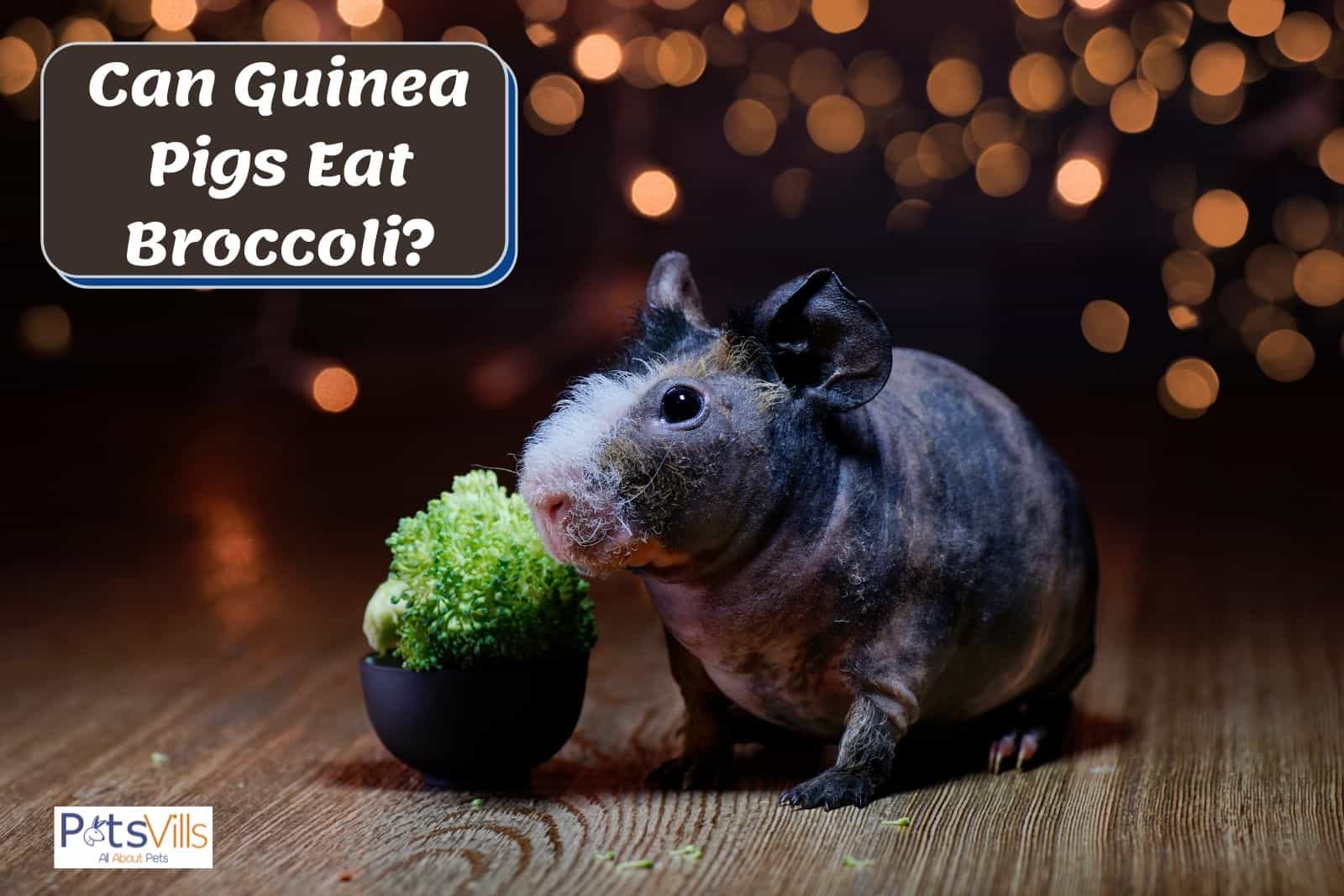Can guinea pigs eat broccoli?
Is it safe in raw form, cooked, or frozen?
If you love this crispy vegetable and wonder if you can feed it to your guinea pigs, I’ve got you covered.
Join me as I take you through everything there is to know about feeding your guinea pig broccoli, plus foods that should make a guinea pig diet.
Don’t forget to also check our guide on “Can Guinea Pigs Eat Dandelion?”
Table of Contents
Can Guinea Pigs Eat Broccoli?
Yes, guinea pigs can eat broccoli, but not daily. Broccoli contains too much oxalates, which cause bladder stones.
Broccoli is also a cruciferous vegetable, and too much of it can cause gas and bloat in guinea pigs.
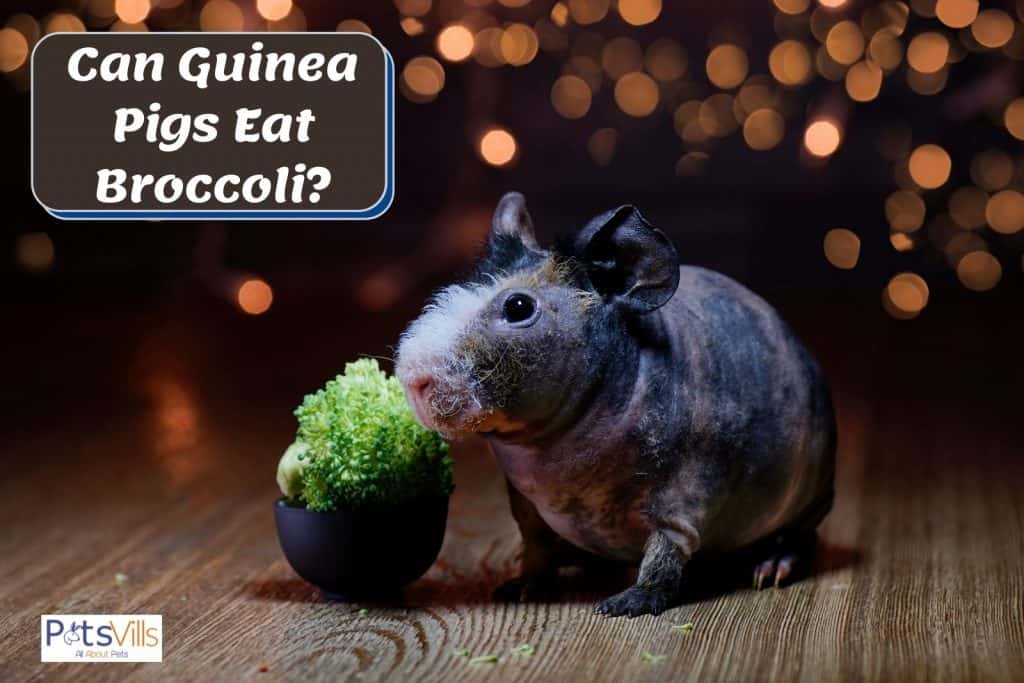
Can guinea pigs eat broccoli stalks?
Yes, they can. All parts of the broccoli plant are safe for guineas. Unlike the spinach stalks, broccoli stalks are soft, less fibrous, and nutritious.
Just make sure they are thoroughly washed before feeding them to your cavies.
Can guinea pigs eat cooked broccoli?
No, cooked broccoli is not safe since it contains harmful additives.
Cooking also alters the nutritional quality of broccoli, or any other vegetables, making it less beneficial to guinea.
Can guinea pigs eat baby broccoli sprouts?
Yes, they can. Broccoli sprouts are packed with the same nutrients as the more mature broccoli.
But you should be mindful about how much you feed to your cavies to prevent bloating.
ALSO READ: Can guinea pigs eat sprout leaves?
Can guinea pigs eat frozen broccoli?
Yes, they can, but the broccoli should be thawed first. Frozen food causes digestive issues such as diarrhea.
Can guinea pigs eat broccoli daily?
They can, but it’s not advisable due to the potential health risks. At least 2 to 3 times per week would be ideal.
Can guinea pigs eat broccoli slaw?
As fun as it would be fun to share this salad with your guinea pig, it’s not safe.
Broccoli slaw comprises a wide range of vegetables that can make a good treat for your piggies.
But the mayonnaise, salt, vinegar, and other synthetic additives make it a hazard.
Can guinea pigs eat Broccoli rabe?
Even though it bears the name “broccoli,” broccoli rabe is not broccoli.
However, it contains the same nutrient benefits for guinea pigs, and it has a considerable amount of oxalates.
So, yes, cavies can eat broccoli rabe, but in small quantities.
Check: Guinea Pig Food List That Is Safe for Your Cavy
Is broccoli good for guinea pigs?
Broccoli is one of the most popular vegetables. Lots of people love it for the crispy nature, tree-like shape, and health benefits.
But we can’t ignore that kids don’t love it for they find the taste horrible.
We can’t blame them since they perceive taste differently compared to adults.
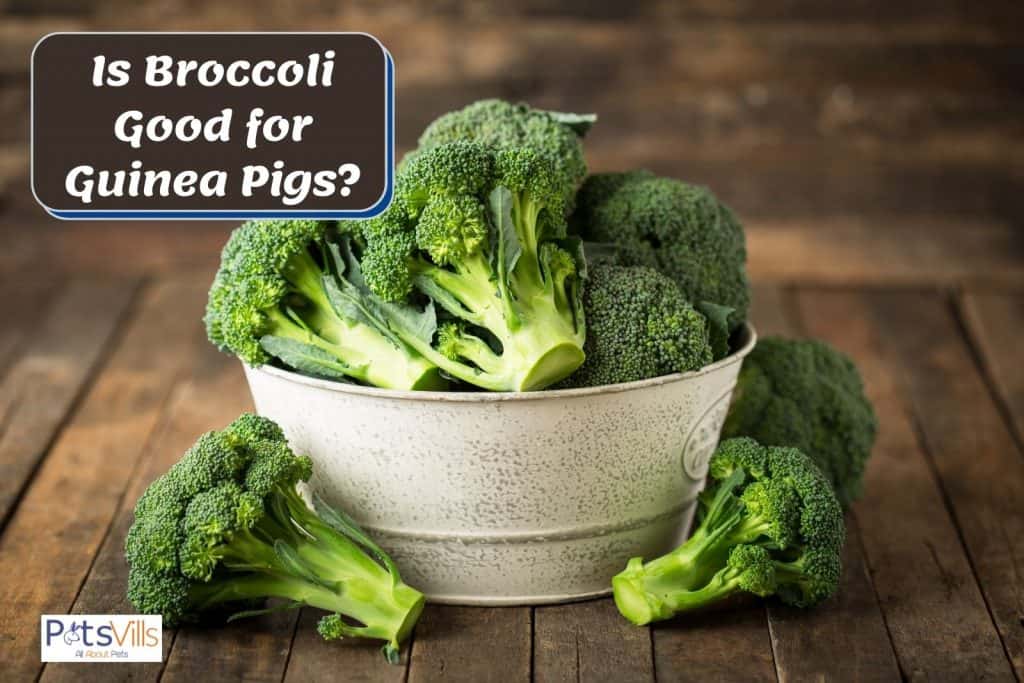
Besides, the health benefits surpass the taste, and guinea pigs love broccoli.
These are some of the vegetables that they won’t stop eating even when they have had enough. But it would help if you didn’t let them overfeed. I’ll explain why shortly.
Broccoli is great for guinea pigs since, according to healthline.com, it contains lots of Vitamin C, and guinea pigs need a lot of Vitamin C from their diet since their bodies can’t synthesize it.
Vitamin C is essential in improving immune health, skin health, and overall body functioning. It also contains a wide range of other nutrients, as shown below;
- Carbs
- Broccoli contains carbs in the form of glucose and other types of sugars and fiber. Fiber helps in digestion and gut health, while sugars are a good source of energy. The sugars are in low amounts, so you don’t have to worry about diarrhea or any other digestive issues caused by too much sugar.
- Vitamin K1
- While the dietary requirement for Vitamin K is not clear for guinea pigs, a report published in the NCBI journal shows that diets with these vitamins play a significant role in hemorrhage prevention.
- Protein
- Guinea pig food should be at least 15% in protein. So you can use broccoli to achieve some of these protein needs.
- Micro minerals
- Broccoli has significant amounts of manganese, iron, and potassium.
- Carotenoids
- Broccoli contains a significant amount of carotenoids, sulforaphane, kaempferol, and other antioxidants essential in eye health, preventing inflammation, and maintaining the ideal blood pressure.
Below is a summary of the amounts of these minerals in one cup of broccoli, courtesy of healthline.com.
| Nutrients | Amount in 91 g |
| Calories | 31 |
| Water | 89% |
| Protein | 2.5 g |
| Carbs | 6 g |
| Fiber | 2.4 g |
| Sugar | 1.5 g |
| Fat | 0.4 g |
Risks to consider when feeding guinea pigs broccoli
Below are some of the issues associated with broccoli.
Bloating and Flatulence
As mentioned earlier, broccoli belongs to the cruciferous vegetable family.
These vegetables contain complex carbs and fibers, which are not always easy to digest, causing too much gas in the guinea pig’s digestive tract.
Some of the symptoms you’ll notice include a lack of appetite, lethargy, rough fur, and swelling along the rib cage.
Not all guinea pigs react to broccoli the same way. So you have to feed them and watch how their bodies react. For some, flatulence is caused by dry food.
Bladder stones/Kidney Stones
Broccoli also contains oxalates, which, when they bind with calcium, form bladder stones.
Small bladder stones aren’t that fatal, but huge bladder stones can cause pain and death if not removed soon.
You may realize shrieks when your guinea pig is defecating or urinating, which shows that they are in pain.
Lethargy, lack of appetite, and blood in the urine or stool are also common symptoms.
To prevent the development of kidney stones, you should make sure your pet gets enough fresh water daily.
But regular vet checkups are also necessary in case some of them have grown too big.
What to do if guinea pigs overeat broccoli
If you notice any of the bloating or bladder stones symptoms, you should contact a vet as soon as possible.
For mild cases, anti-bloating medication can help in relieving the gas. But if the case is too severe, surgery is necessary to deal with gas or bladder stones.
How often can you feed broccoli to guinea pigs?
If your guinea pig tolerates broccoli and it doesn’t seem to affect her in any way, you can feed mix broccoli with other vegetables daily.
However, since the oxalates are still an issue, it’s still best to feed them in small amounts a few times a week.
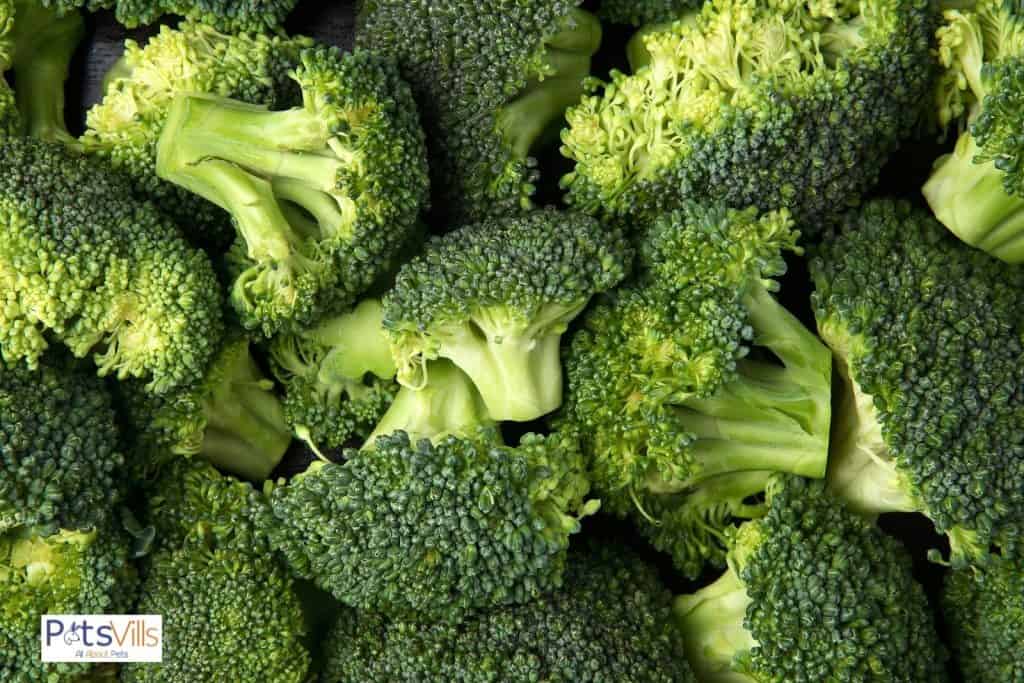
Speaking of amounts, half a floret in each serving seems to work for most people. They will gladly munch on the stalk, too, so you don’t have to remove it.
Preparing broccoli for your guinea pigs
Below are some steps in preparing a broccoli treat for your cavies.
- Get fresh broccoli from a trusted supplier. Organically grown broccoli is preferable but is often expensive, so if you don’t have access to that, regular broccoli will be fine.
- Check for rotten sections, discolored sections, or any spots and remove them.
- Wash the broccoli thoroughly. Broccoli has tiny leaves which are crowded around a stalk. Dirt and bacteria can hide between these leaves, making it challenging to spot them.
- Cut the broccoli into smaller pieces. It’s also best to mix broccoli with other vegetables or fruits to make a fun treat. You can also incorporate a fun game such as hide-and-seek to make feeding time more fun.
- Remove any uneaten broccoli within 2 to 3 hours to prevent contamination.
READ MORE: What Kind of Fruit Can Guinea Pigs Eat?
4 Alternatives to broccoli in a guinea pig’s diet
If your guinea pigs don’t love broccoli, or you’re looking for safer alternatives that won’t affect their health, below are some of them.
#1 Lettuce
Lettuce is a perfect alternative to include in a guinea pig’s diet.
It doesn’t contain a lot of oxalates, fats, or sugar content, making it suitable for feeding your guinea pigs daily. It’s a good source of vitamin C, water, and fiber.
The best types of lettuce to feed your guinea pigs are romaine lettuce, red leaf lettuce, and green leaf lettuce.
Lettuces such as Iceberg lettuce should be avoided since they cause diarrhea and other digestive issues.
#2 Spinach
This leafy green is a sweet and excellent guinea pig treat. Spinach contains a considerable amount of Vitamin C, Vitamin k, calcium, phosphorous, and antioxidants.
Unfortunately, it contains too much calcium and oxalates, so overfeeding your guinea pigs with spinach could lead to bladder stones.
We have covered everything there is to know about spinach for guinea pigs in this post – Can guinea pigs eat spinach?
#3 Kale
Kale is another excellent leafy green packed with vitamins, dietary fiber, proteins, and low sugar content.
It’s also known for a higher sodium content which increases the thirst in guinea pigs. If your cavies rarely use the water bottles, they’ll want to use them after eating kale.
All types of kale have almost the same nutrient levels.
However, it still contains too much calcium, which makes guinea pigs more prone to bladder stones. Kale is perfect as an occasional treat.
#4 Cucumber
Cavies need all the water they can, especially those that don’t love using water bottles or when it’s too hot, and they need to stay hydrated.
That’s why you should include vegetables with high water content, such as cucumbers.
Besides water content, they also contain vitamins A, C, and K, minerals, and antioxidants, which are helpful to guinea pigs.
However, too much cucumber could lead to stomach upsets in guinea pigs. So, keep the amounts to a few pieces and a few days a week.
ALSO CHECK: Can guinea pigs eat edamame?
What should guinea pigs eat?
While there are many vegetables to feed your guinea pigs, these types of foods only form a small percentage of their diet.
Below is a guinea pig diet profile and how much you should feed each type of food.
Hay/Grass
Wild guinea pigs feed mainly on grass, herbs, or twigs. To replicate this diet for captivity-raised guinea pigs, you should ensure they have access to hay or grass 24/7.
Hay contains balanced amounts of Vitamins (especially Vitamin C), minerals, carbs, proteins, water, and other nutrients a guinea pig needs.
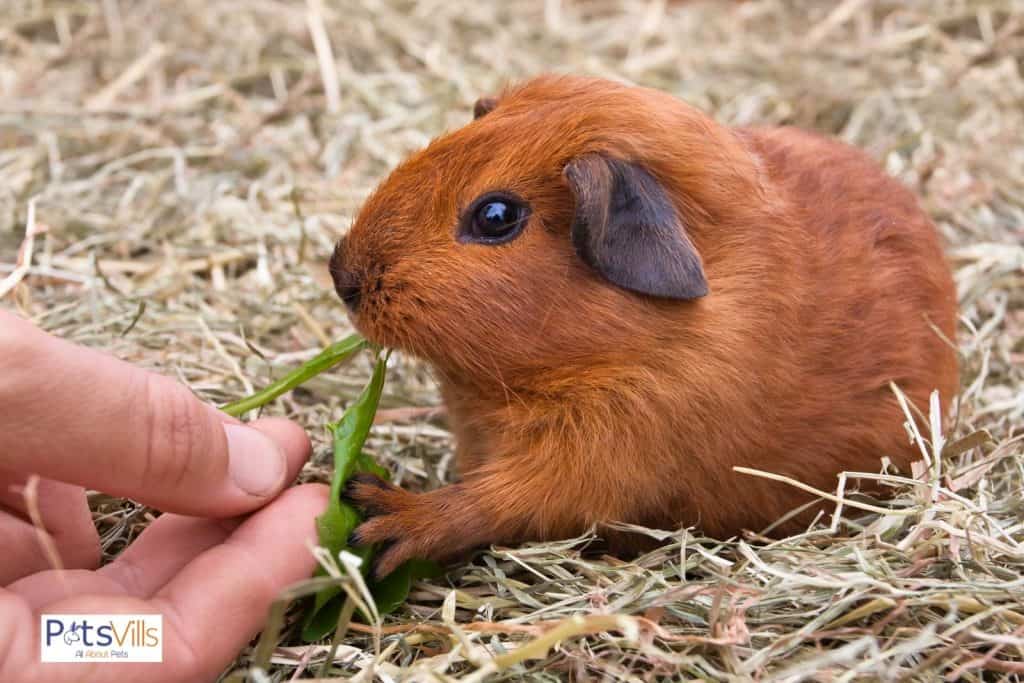
Besides providing nutrients, hay is also a good way to keep your guinea pigs busy all day and prevent boredom or depression.
Hay also helps in maintaining proper dental hygiene in guinea pigs. Guinea pig teeth can grow very long if left unattended.
But since hay is rough, munching on hay all day makes sure the teeth remain at an ideal height. It’s similar to how scratching posts help trim a cat’s nails.
You can fill the toilet paper rolls or paper bags to create a fun toy that they’ll keep munching on all day.
They are also many other ways to make the hay more enticing to guinea pigs. Not all hays are perfect for cavies, though. T
Timothy hay, grass hay, barley hay, or oat hay are the most recommended types of hay.
Avoid hays such as clover hay or lucerne hay since they contain too much protein and calcium, leading to health issues in guinea pigs.
Twigs
Besides hay, you can also keep your guinea pigs healthy and busy all day by offering twigs.
Whole twigs (including the leaves and flowers) of the following trees are ideal for guinea pigs;
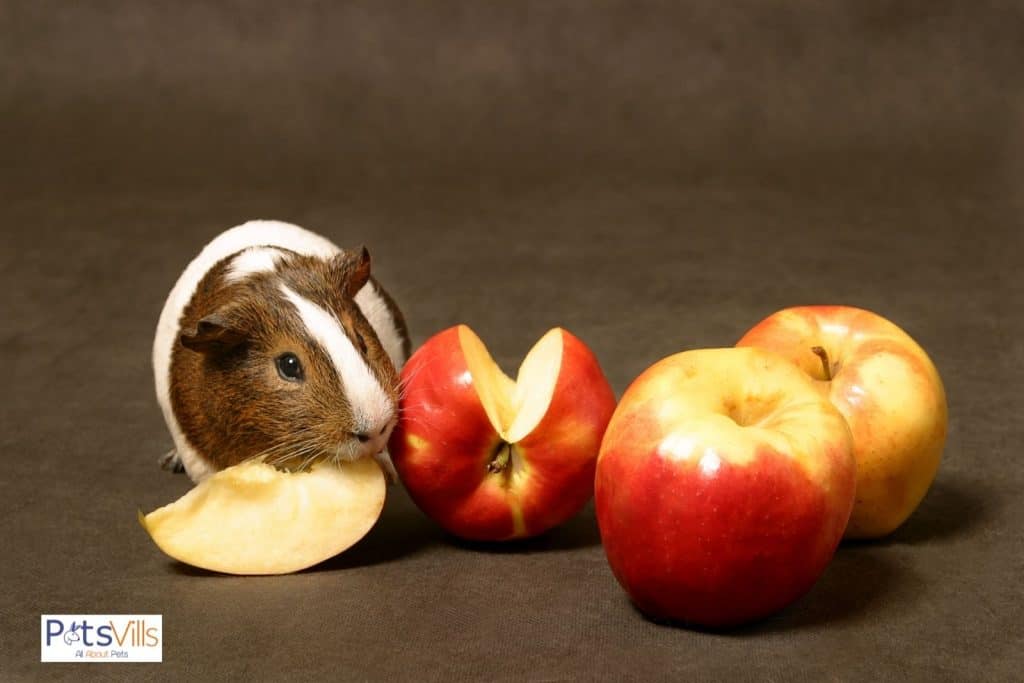
- Pears
- White apple
- Maple
- Kiwi
- Bamboo cane
- Poplar
- Kudzu
- Kiln-dried pine
- Sycamore
- Juniper
- Cholla
- Basswood
- Alfalfa
Avoid tree branches from the following trees;
- Cedar
- Cypress
- Eucalyptus
- Cashew
- Elm
- Almond
- Apricot
- Beech
- Birch
- Blackwood
- Bogwood
Vegetables and fruits
Veggies and fruits are best offered as treats, and they are also additional sources of Vitamin C.
As mentioned earlier, guinea pigs need dietary Vitamin c since their bodies can’t synthesize or store these vitamins.
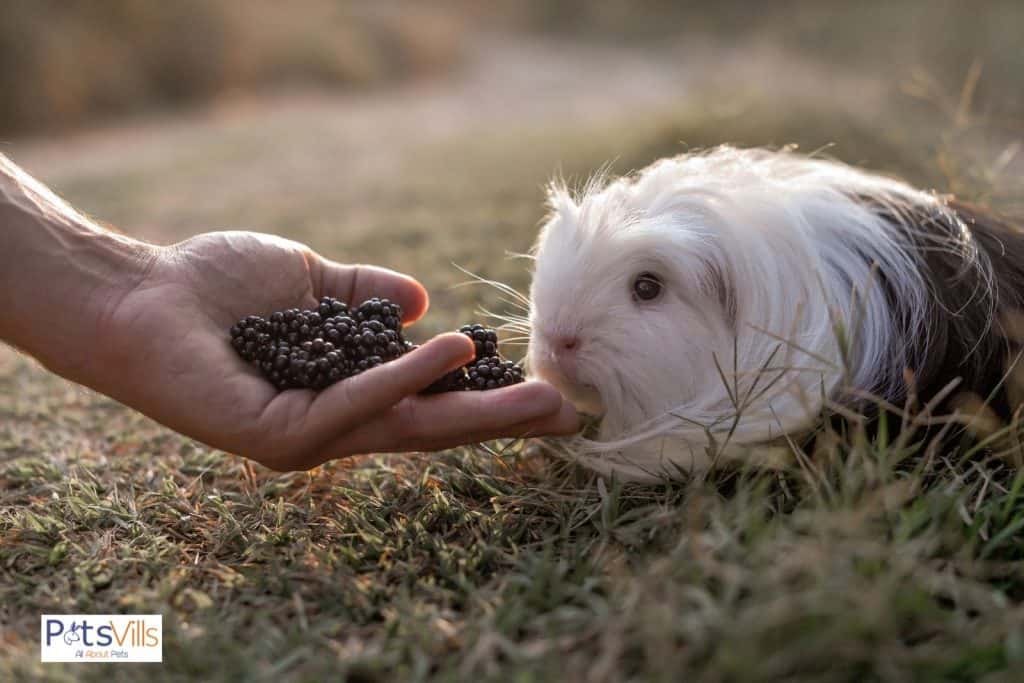
While they contain a lot of nutrients, most of them are associated with health issues. We’ve already established that with broccoli and spinach.
You can offer at least 1 cup of veggies where you include lettuce, kale, spinach, dandelion, Swiss chard, cabbages, mint, zucchinis, etc.
Some fruits that guinea pigs will love include apples, papaya, mango, strawberries, blueberries, and cantaloupe.
A perfect treat can contain either fresh fruits or vegetables or dried vegetables. However, dried fruits are not safe for guinea pigs since they have too much sugar.
Commercial food
While guinea pigs can get most of their nutrients from hay and veggies, it’s still essential to include commercial food, especially those fortified with Vitamin C, minerals, and salts.
They are often sold in the form of dry food, pellets, or mineral wheels.
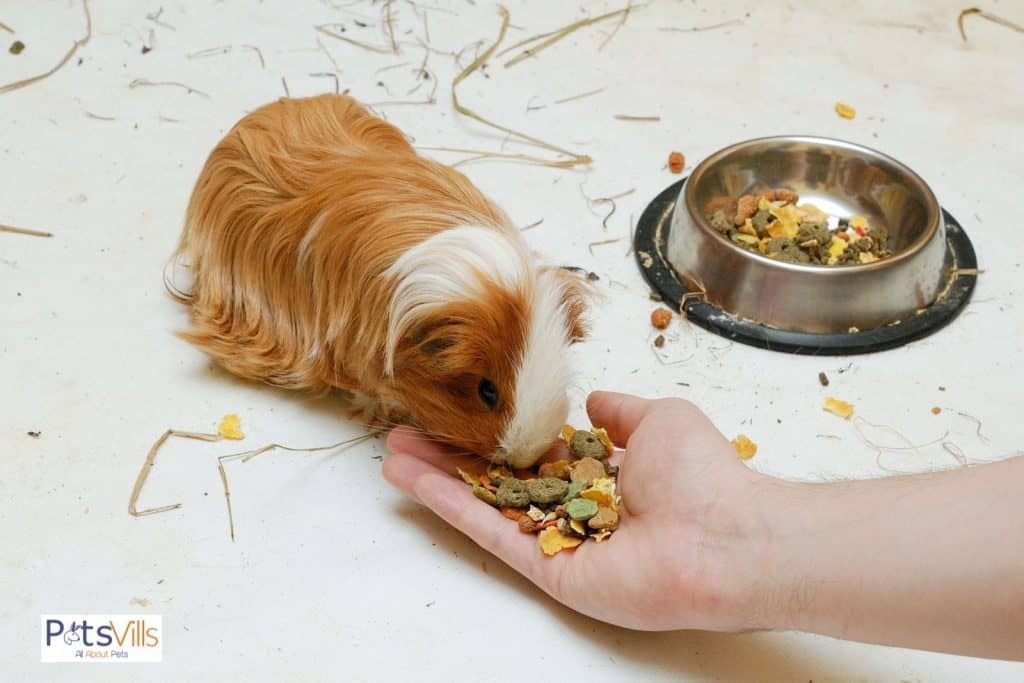
Seeds
Seeds from fruits and vegetables can be an additional source of fats and proteins.
A good example is the tomato seeds and cucumber seeds. While sunflower seeds seem like a good alternative, they are a choking hazard, and you should be careful when feeding them to your pet.
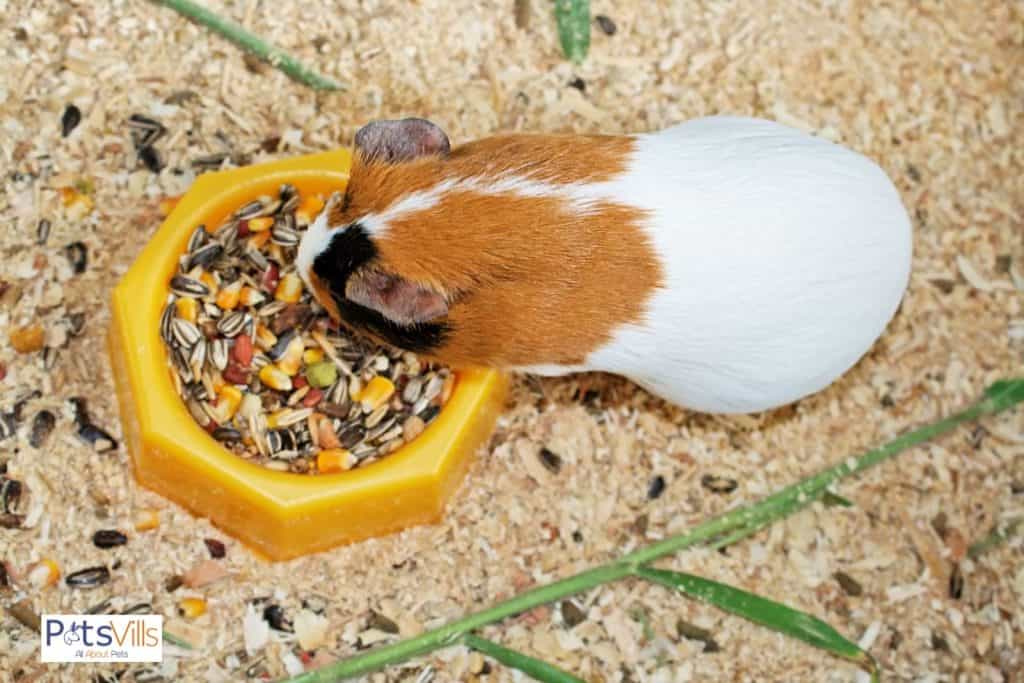
Besides, they don’t contain as many nutrients as hay or veggies, so feed them sparingly.
Water
A healthy guinea pig diet is incomplete without water. Guinea pigs can drink up to 300 ml of water in a day.
So make sure there’s a constant supply of fresh water. It’s also best to replace the water in the water bottles every 24 hours to prevent contamination.
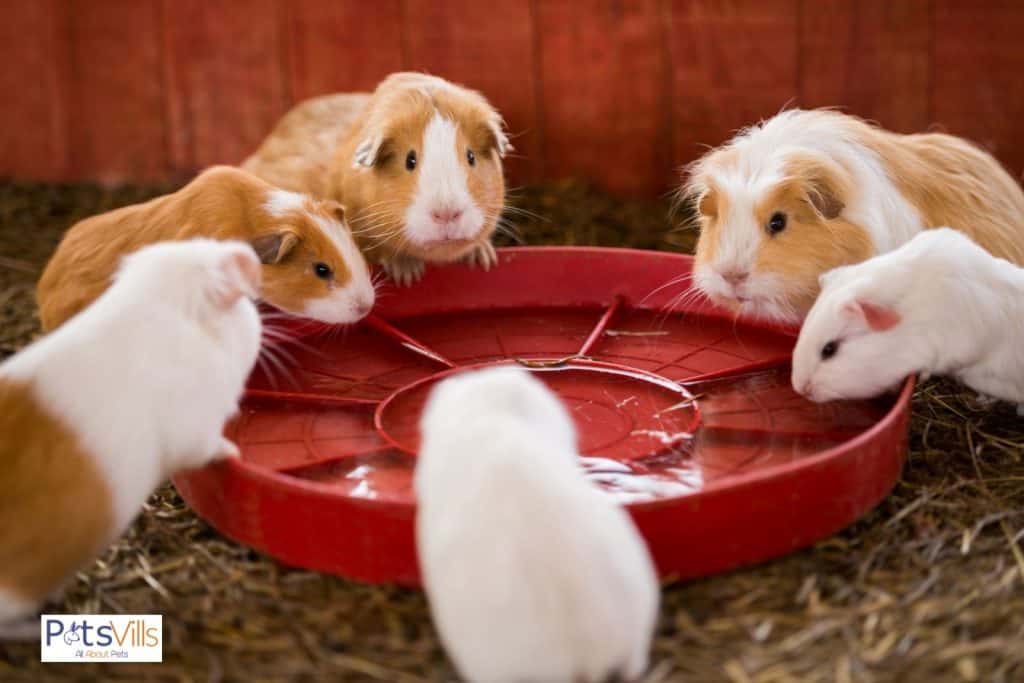
6 Foods guinea pigs can’t eat
Not all foods are safe for guinea pigs. And it’s your job as a pet owner to find out what guinea pigs can and can’t it since they can’t discern on their own.
Now that you know that they can eat broccoli and other foods that should be in their diet, below is a comprehensive list of what they shouldn’t eat.
#1 Plants with too much oxalic acid
Oxalates are bad news to animals and people. A combination of oxalates and calcium and oxalates leads to bladder stones, and it inhibits the absorption of calcium into the body.
A combination of too much oxalates and fiber will inhibit the absorption of other essential nutrients into the guinea pig’s body.
That’s why it’s always advisable to avoid plants with high concentrations or only feed them in small amounts.
I’ve already mentioned spinach and broccoli, which are in this category. Others include;
- Rhubarb
- Beet greens
- Swiss chard
- Turnip greens
- Star fruit
- Peanuts – these are hard for guinea pigs to digest.
- Endive
- Beans
NOTE: As you can see, most plants with oxalates are quite nutritious, so you don’t have to avoid them entirely. Follow the guidelines about each when feeding your cavies.
#2 Gassy vegetables
These are other vegetables that, even though they aren’t toxic, upset your guinea pig’s digestive system and cause too much gas that guinea pigs cannot relieve.
All cruciferous vegetables are gassy, and they include;
- Broccoli
- Cabbages
- Cauliflower
- Brussels sprouts
- Bok Choy
- Radishes
#3 Poisonous plants
Some plants are just toxic to guinea pigs and can cause a wide range of health issues. Below are some of them;
- Onions, garlic, and other bulb plants
- These plants contain toxins such as disulfide, trisulfide, or Allyn. These compounds can cause itchy eyes, diarrhea, inflammation, and respiratory issues.
- Buttercups
- Both flowers and leaves of the buttercup plants can cause severe digestive tract discomfort. If you love taking your piggies to graze outside, make sure you don’t have these plants in your yard.
- Potatoes
- Raw potatoes contain alkaloids that will make your guinea pigs sick. The alkaloid content level is often higher in the greenish potatoes (those exposed to the sun for some time). Potatoes also contain too many carbohydrates, while guinea pigs are more inclined to hay and leafy greens for their nutrient needs.
- Avocado
- The fleshy part of the avocado is not toxic. It’s a good source of Vitamin c, minerals, and fat. However, they contain too much fat and could lead to rapid weight gain in guinea pigs. All other parts of the avocado contain higher amounts of a toxin known as persin, which could be harmful to guinea pigs.
- Cereals
- Cereals such as rice, corn flakes, cheerios, and Krispies aren’t toxic, but they contain too many carbs. Feed them sparingly to prevent obesity. They are also not suitable for very young guinea pigs.
- Other toxic plants you should avoid include yew, daisies, Ivy, Ragwort, Hemlock, and foxgloves.
#4 Dairy products
Milk, cheese, cream, yogurt, or any other dairy products are unsuitable for their digestive system.
Guinea pigs are naturally lactose intolerant, so dairy products can cause severe digestive issues.
Besides dairy products, you should also avoid processed food such as bread, biscuits, candy, and sugary foods.
#5 Meat
Again, guinea pigs are vegans; their digestive systems aren’t equipped to digest meat or other meat products.
That includes meat-based dog or cat food. Meat makes guinea pigs severely sick, and it could eventually lead to death.
#6 Chocolate
If you’re thinking of sharing that chocolate snack with your furry friend, don’t. Chocolate contains caffeine and theobromine, which are both harmful to guinea pigs.
Chocolate also has a very high-fat content which could lead to obesity in guinea pigs. Even small amounts of chocolate could kill your cavies.
Can guinea pigs eat broccoli FAQs
Can too much broccoli kill guinea pigs?
Not really. There haven’t been any cases where guinea pigs died from too much broccoli. Broccoli is a healthy vegetable with considerable amounts of Vitamin C, minerals, and antioxidants. But too much of it could cause gas, bloating, or kidney stones.
Can guinea pigs eat all parts of broccoli?
Yes, they can. All parts of a broccoli plant are safe and nutritious for your cavies.
What can guinea pigs eat daily?
Hay is the primary source of nutrients for guinea pigs, preferably Timothy hay. Commercial foods such as pellets are also essential in meeting the cavies’ dietary needs. Some vegetables, such as lettuce, can be fed daily, but most of them are best served as treats.
Conclusion
Guinea pigs can eat broccoli, but not too much, or eat to prevent gas build-up. Feed them just a few pieces a week and mix them up with other vegetables.
All parts of the broccoli are safe for cavies. If they overeat it and seem gassy, though, contact your vet ASAP.
As we’ve established, broccoli and other vegetables only form a percentage of a guinea pig’s diet.
Their daily diet should include a lot of hay, some Vitamin C fortified commercial food, and adequate fresh water.
Twigs are also a good way to help your piggies gain more nutrients and reduce boredom.
Some harmful foods you shouldn’t feed your piggies include bulb plants, potatoes, daisies, buttercups, avocado plants, meat, chocolate, and dairy products.
Guinea pigs are obligate herbivores, any food or treat that isn’t raw plants should be avoided.
References:
- “Guinea Pig Feeding.” 2018. The Humane Society of the United States. 2018. https://www.humanesociety.org/resources/guinea-pig-feeding.
- Holowaychuk, Marie K. 2006. “Renal Failure in a Guinea Pig (Cavia Porcellus) Following Ingestion of Oxalate Containing Plants.” The Canadian Veterinary Journal 47 (8): 787–89. https://www.ncbi.nlm.nih.gov/pmc/articles/PMC1524846/.
- “What Should I Feed My Guinea Pigs? – RSPCA Knowledgebase.” 2018. Rspca.org.au. November 9, 2018. https://kb.rspca.org.au/knowledge-base/what-should-i-feed-my-guinea-pigs/.
- “Your Guinea Pig’s Diet.” n.d. Www.pdsa.org.uk. https://www.pdsa.org.uk/taking-care-of-your-pet/looking-after-your-pet/small-pets/your-guinea-pig-s-diet.
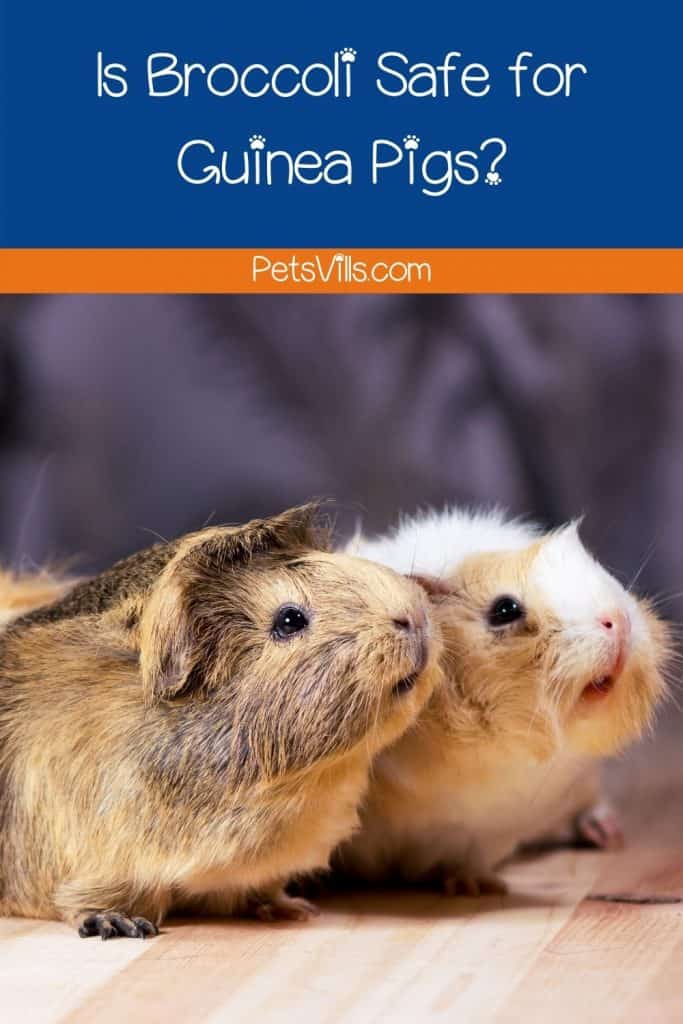
Can guinea pigs eat broccoli? Do your cavies like it? Share with us!
Barry Stingmore is a British content writer living in Fuerteventura, Spain. An animal lover at heart, he shares his home with a dog and four rescue cats and has a passion for writing about animals big and small.
Barry loves finding answers to your animal-related questions, the more research involved the better! You can rely on him to find the facts.
Find him on FACEBOOK, TWITTER AND Linkedin
Read his latest ARTICLES.
Find more about him HERE.

